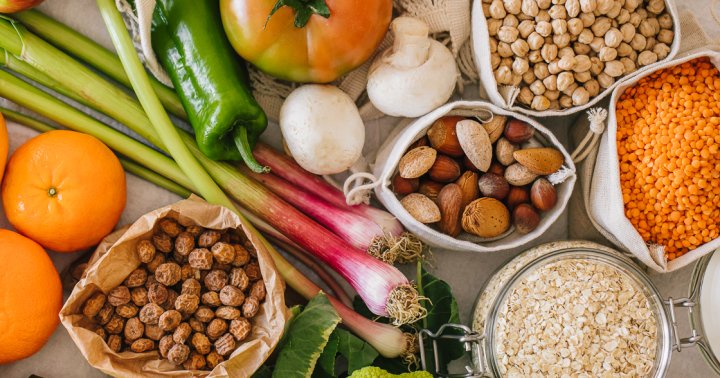I'm A Princeton-Trained PhD & These 3 Foods Will Optimize Your Metabolism
Check out her favorite grocery staples.


Our editors have independently chosen the products listed on this page. If you purchase something mentioned in this article, we may earn a small commission.
September 26, 2022 — 14:01 PM
At mindbodygreen, we’ve waxed poetic on the importance of gut health. But in case you need a quick reminder: Your gut is at the forefront of basically every function in your body, including, yes, your metabolism.
As the research becomes more and more complex, the connection between gut health and metabolism has never been more evident. “Now that microbiome research is really picking up, it's becoming pretty clear that certain species of bacteria in the gut play very important roles in health,” Princeton-trained metabolic health expert Alexis Cowan, Ph.D., says on this episode of the mindbodygreen podcast.
In fact, it wasn’t until Cowan focused on optimizing her gut that she really saw positive changes to her metabolic health. Below, she shares a few of her favorite grocery staples for stellar gut health—which, in turn, helped her enhance her metabolism and maintain a healthy weight.
According to Cowan, your gut bacteria love polyphenols, which are a group of plant-based chemicals with potent antioxidant abilities. “Dark red fruits, like pomegranates, cherries, dark grapes, wild blueberries, raspberries, blackberries…these all contain molecules called polyphenols, which are essentially antioxidant molecules,” she explains. “So in addition to scavenging free radicals, they also directly feed these bacteria [and] serve as a food source.”
Essentially, anything red-colored and highly pigmented is great for boosting gut-healthy bacteria. But if Cowan had to pick a favorite, she specifically touts red apples. “The red pigment in red apple peels is a specifically good food source,” she notes. She says you can even find red apple peel powders on the market (of course, make sure you’re buying a high-quality option), but filling your basket with juicy, dark red apples is a solid move, too.
“Prioritizing the maintenance of muscle mass has to play a big role [in metabolic health], especially throughout the aging process,” Cowan explains, which is why she recommends “a diet that both has adequate protein to maintain and grow muscle as well as polyphenols to mitigate inflammation and optimize the microbiome.”
That said, it's important to make sure you're getting enough protein. And sure, there are plenty of plant-based sources you can add to your diet, but Cowan recommends some wild-caught, sustainably sourced fish, if it fits within your lifestyle. “Shellfish are amazing sources of protein and micronutrients,” she says (think shrimp, crab, lobster, clams, oysters, and mussels). “I think leaning more towards smaller fish is good, and if you can get them fresh, that would be even better,” she adds (as opposed to canned). But if tinned fish is more accessible to you, then by all means—tinned fish tends to be a more sustainable option, anyway!
Yes, Cowan is a fan of coffee. However, “There are ways to optimize your coffee intake to make sure that you're getting the most out of it without experiencing some of the drawbacks,” she notes.
First thing’s first: “A lot of people will use coffee to help them go to the bathroom, which is a red flag to begin with,” she says. Essentially, you’ll want to make sure that you’re in it for the right reasons. “[Make sure] you're not using it as a way to promote a natural bodily function,” Cowan adds.
It’s also important to ensure you’re using quality coffee beans. Coffee itself can carry a specific type of mycotoxin (meaning, a toxic chemical product produced by fungi), and it can be very prone to mold contamination depending on how its stored—remember, mold thrives in damp, dark environments. “So it's important to get a coffee source that is third party tested for mycotoxins.
Finally, Cowan recommends optimizing the energizing benefits of coffee by combining it with a source of fat—think coconut cream, coconut oil, butter, or ghee. “Something that has a little bit of protein with the fat to help emulsify into the coffee,” she explains. “The fat essentially will bind onto the caffeine, because the caffeine's fat soluble, and it creates a time-released source of caffeine, so that you don't get an immediate peal and then a crash in the afternoon. Instead, you're adding to that slow, sustained energy that ultimately I think everybody's looking for when they're going into their workday.” Not to mention, coffee is a good source of antioxidant polyphenols. So feel free to drink up!
The gut-metabolism axis is very much real. Take it from Cowan, who was unable to enhance her metabolic health until she got her gut health up to snuff. Of course, plenty of other foods are A+ for gut health—find a full gut health diet here—but if you’re looking for just a few staples, you can’t go wrong with the above.
And do you want to turn your passion for wellbeing into a fulfilling career? Become a Certified Health Coach! Learn more here.
Reset Your Gut
Sign up for our FREE doctor-approved gut health guide featuring shopping lists, recipes, and tips
You are now subscribed
Be on the lookout for a welcome email in your inbox!
https://www.mindbodygreen.com/articles/3-foods-to-optimize-metabolism-from-princeton-trained-phd

 BigThink
BigThink 
































